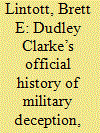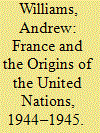|
|
|
Sort Order |
|
|
|
Items / Page
|
|
|
|
|
|
|
| Srl | Item |
| 1 |
ID:
149468


|
|
|
|
|
| Summary/Abstract |
This article analyses an episode in the development of intelligence official history in Britain. While an official history of intelligence in the Second World War was not approved until the 1970s, the idea had been pursued seriously in 1945 by Brigadier Dudley Clarke. Clarke had been the chief of deception operations in the Mediterranean theatre, and wanted to develop an official history and film recounting some of the exploits of his unit. This article argues that Clarke’s proposals, which were ultimately rejected by the Joint Intelligence Committee and the Chiefs of Staff, showed a prescient understanding of the power of official history, recognized that complete secrecy would be counter-productive, and are thus an important early milestone in the evolution of intelligence official history.
|
|
|
|
|
|
|
|
|
|
|
|
|
|
|
|
| 2 |
ID:
154111


|
|
|
|
|
| Summary/Abstract |
During their long exile during 1940–1944, various components of the “Free French” were largely kept out of the “Post-War Planning” process that took place in the American State Department. They perceived this absence as a major, and often deliberate, humiliation that made the circumstances of their exile all the more exasperating. Charles de Gaulle was seen by the “Anglo–Saxon” Allies as a figure of dubious worth and usefulness, and Washington’s general tone was to dismiss the exiles as the “so-called Free French.” They were admitted to the decision-making process only slowly and grudgingly, and not until after many of the key decisions about organising the United Nations had been taken. This article shows how that exclusion affected the French leadership, how they reacted, and suggests some lasting results. It also assesses to what extent France had a coherent contribution to the formation of a global international organisation during 1943–1944, and what factors inhibited France properly articulating that contribution.
|
|
|
|
|
|
|
|
|
|
|
|
|
|
|
|
| 3 |
ID:
188658


|
|
|
|
|
| Summary/Abstract |
The Pacific theater of World War II represents a turning point in the history of navigation: whether a ship’s commander should entrust the safety of his vessel to his own judgment based on years of practical experience at sea or rely instead on radio broadcasts, the beginnings of “big data,” and the output of detection systems, including radar. U.S. naval campaigns in the Northwest Pacific during World War II, when some of the largest armadas of naval vessels ever assembled were continuously at sea in a relatively restricted maritime area for months at a time, provide notable occasions when the old and the new knowledge were tested under extreme weather conditions and the exigencies of wartime operations. This article examines the role of typhoons and the science of their prediction in relation to U.S. naval operations in the Pacific theater in 1944–1945.
|
|
|
|
|
|
|
|
|
|
|
|
|
|
|
|
| 4 |
ID:
159432


|
|
|
|
|
| Summary/Abstract |
The essay at hand covers the operations on the southern flank of the German front in Yugoslavia from October 1944 to April 1945. During this period, the Germans managed to extricate their XXI Mountain Corps from virtual encirclement on two occasions (in Montenegro and the Bosna River Valley) and ultimately reinforce their hard-pressed main line in the Balkans with this battered, but still battle-worthy, formation. This article will provide the reader with a brief description of this little-known campaign and explain the reasons behind what was probably the Yugoslav Partisans’ greatest “lost victory” of the war. The main argument is that such an outcome was largely the result of the Yugoslav leadership’s refusal to award sufficient attention to this sector of the front and the internal political considerations, but also of the German army’s skillfully conducted defense. The article will also dwell on the battlefield effectiveness of both sides, and the Partisans’ efforts to become a regular army in both their outlook and operational manner.
|
|
|
|
|
|
|
|
|
|
|
|
|
|
|
|
|
|
|
|
|